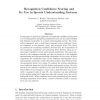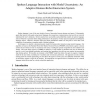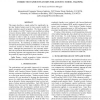331 search results - page 8 / 67 » Corrective Models for Speech Recognition of Inflected Langua... |
TSD
2005
Springer
14 years 1 months ago
2005
Springer
Although speech, derived from reading texts, and similar types of speech, e.g. that from reading newspapers or that from news broadcast, can be recognized with high accuracy, recog...
IUI
2005
ACM
14 years 2 months ago
2005
ACM
A principal problem in speech recognition is distinguishing between words and phrases that sound similar but have different meanings. Speech recognition programs produce a list of...
CSL
2002
Springer
13 years 8 months ago
2002
Springer
In this paper we present an approach to recognition confidence scoring and a set of techniques for integrating confidence scores into the understanding and dialogue components of ...
CONNECTION
2008
13 years 8 months ago
2008
Spoken language is one of the most intuitive forms of interaction between humans and agents. Unfortunately, agents that interact with people using natural language often experienc...
ICASSP
2008
IEEE
14 years 2 months ago
2008
IEEE
This paper describes a simple method for significantly improving Tandem features used to train acoustic models for large-vocabulary speech recognition. The linear activations at ...



